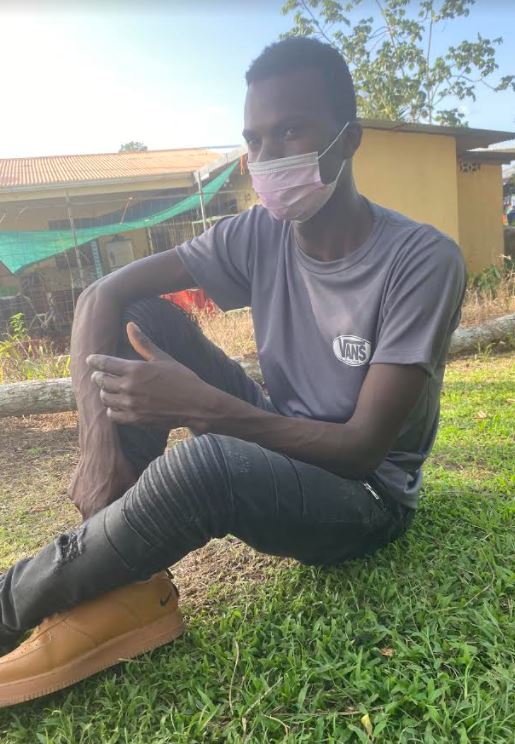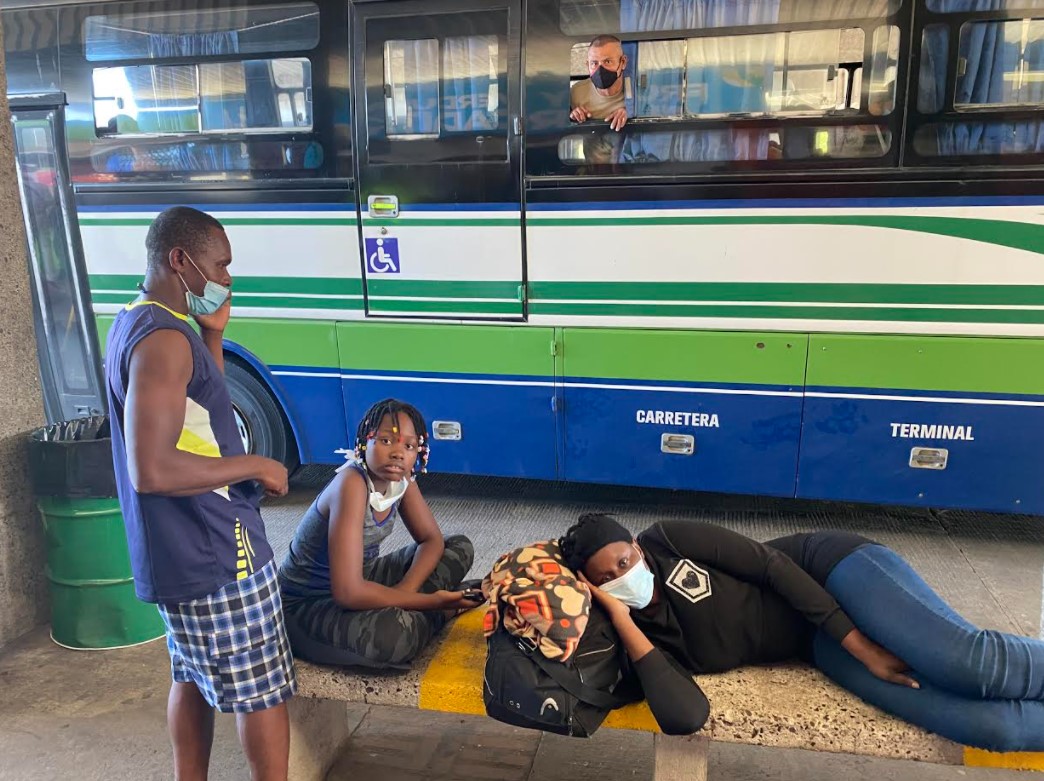
By Todd Bensman as published July 6, 2021 by the Center for Immigration Studies
LA CRUZ, Costa Rica – A 24-year-old Haitian man in a local motel near the bus station here – readying to move through Nicaragua – revealed a truth at sharp variance with common media and immigration-activist narratives about the large numbers of Haitians now illegally crossing the U.S. southern border.
The story is that Haitians who are now flooding through and gaining admittance and bus rides to American cities need permanent asylum to avoid deportation to the violence, poverty, and government persecution they’ve just fled in their home country.
But Center for Immigration Studies interviews with the Haitian man pictured here and with dozens of others during a recent 10-day period in northern Costa Rica indicate that this narrative is mostly fable. Significant numbers of Haitians recently arrived in the U.S. or still en route enjoyed years of peace and relative prosperity in Chile, which boasts South America’s strongest economy and a government generous with residency and work authorization for Haitians. He and his brother arrived in Chile four years ago; its government has provided safe harbor to at least 185,000 Haitians as of 2020.

In fact, every U.S.-bound Haitian that CIS met here – more than two dozen – said they had lived and worked in the safety, security, and prosperity of Santiago, Chile’s capital. for four, five, or even six years. Others lived in Brazil, the world’s eighth largest economy strongly rebounding from the pandemic. Now, tens of thousands are, in calculated moves, unmooring from their comfortable Chilean lives for an upgrade at the U.S. border, including this Haitian whose brother recently crossed and beckoned him to the easy entrance and richer rewards of United States life.
Asked how four years of life in Santiago, where he’d worked as a baker and Uber Eats driver, compared to the Haiti they’d left years ago, the probable future U.S. asylum claimant promptly answered: “A thousand times better.”
Then why come to the United States border now, when his life in Chile was so peaceful and non-threatening?
“Because,” he said, chuckling, “life in the United States will be a million times better.”
To achieve U.S. asylum, which provides work authorization and leads to a green card and eventual citizenship, petitioners must persuade asylum officers and immigration judges that if deported they face government persecution on the basis of at least one of five conditions, such as their political opinion, ethnic or religious affiliations.
Did the government of Chile ever threaten you, CIS asked?
“No, that never happened there.”
So you were never afraid?
“No, never.”
The young Haitian man showed videos of beautiful Chilean beaches he’d enjoyed and others depicting warm memories of urban Chilean nightlife. He said he always found enough work to support himself and a lifestyle allowing him buy his favorite fashion clothing brands on the Internet.

“It’s a nice country,” he said of Chile.
All the Haitians CIS interviewed said that the triggering development in their decisions to abandon the good life in Chile was that President Biden started letting in Haitian families who illegally crossed the American border so that they could apply for asylum and secure an economic upgrade. Several women in advanced stages of pregnancy timed their journeys to reach U.S. soil in time to give birth U.S. citizens.
This Haitian man said he was well aware that single men like himself, his friend here in La Cruz, and the brother can evade Border Patrol and be home free because the Biden administration has eliminated most deportation activity.
The Joe Biden’s election “makes it easier to get into the States. It’s a reason,” the Haitian said for leaving now.
All Haitians CIS interviewed offered similar stories and motivations.

Some mentioned that they felt driven from Chile by a sting of racism among regular citizens, though not from its government.
“I felt persecuted because of my skin color and because we don’t speak Spanish,” one said.
However, none of the Haitians who mentioned street-level racism seemed much dissuaded when reminded that President Biden, Vice President Kamala Harris and many prominent American lawmakers have repeatedly declared that “systemic racism” permeates the United States.
Laughing out loud at the idea that America was racist, the young Haitian man at the La Cruz motel said he did not believe any of those high-level government assertions.
“No. No. America isn’t racist,” he said.
Instead, the more common calculation seemed to be a desire to trade up from a good life to a better one.
Ronald Polydor, 25, recently arrived in Los Chiles, in northern Costa Rica, with 15 other Haitians by bus for an overnight stay in a bare-bones hostel with his wife and 6-year-old son. In the morning, they would all be moving with smugglers through Nicaragua.
Polydor said he’d been supporting the family as a mechanic in Chile for four years and had even found opportunity there to obtain advanced certifications in his field. Chile provided legal residency and plenty of work. Never did the government there persecute Polydor or any Haitian he knew over all the years he lived there.
“No. No. No. No,” he answered when asked that question.
But Polydor twice had no luck applying for a nonimmigrant visa to the United States, neither as a tourist nor a student.

The U.S. turned down his visa applications for no apparent reason, he said, though he probably was rejected because Haitians are at high risk of abusing such visas and overstaying them to live illegally in the country in perpetuity. Now, he laughed, the illegal way to enter is, paradoxically, legal and he got on the road as soon as he could raise the smuggling money.
He wanted to leave Chile because he believes he can earn in a month what he could earn in an entire year in South America.
“I prefer the legal ways but now, it’s up to God,” he said, chuckling at his good timing.
Tomas Hubian, a 26-year-old father of a 9-year-old and 3-year-old boy said he’d been living in Santiago for the past four years, knowing his smuggling money would go to waste due to President Trump’s border enforcement policies.
“When he [Trump] was in, it took luck,” to cross over successfully. “We would have been put back in Mexico and lost our money.”
He never lacked for work and money to support his family in Chile. Hubian said he felt safe, secure, and never once threatened by the government. Hubian said he and his wife used their time in Chile while Trump was in office to save smuggling fee money for when Trump was out.
As soon as Biden won, Hubian said, word arrived from the U.S. border that parents with children and pregnant women were receiving fast-pass legal authorization to go anywhere in the United States.
“If we have kids, my friends said, we have a high chance of getting through.”
Although Hubian did not specifically know about American political asylum, it’s a safe bet the same friends will let him know that his next step once in the city of his choice will be to apply for asylum on a claim that he simply cannot be returned – to Haiti. Not a word about Chile.
Timing Migration and Birth

For others, the chance to give birth to an American citizen was part of the calculation. CIS observed many of the Haitian women on the smuggling trail in Costa Rica were in advanced stages of pregnancy, often seven months.
Haitian national Peter Thesaus, 25, who was traveling with a wife and Brazilian-born child to join a relative in Florida, said his 6-month pregnant sister is on the way from Brazil further south. He and his extended family had been living and working comfortably and securely for six years in Brazil, on his job with a local hospital, until Biden’s election prompted his departure.
He admitted that his pregnant sister’s trip was carefully timed so that the child would be born an American. That would help the child qualify for a variety of welfare benefits, of course, but also help anchor the rest of the family and dissuade family-separating deportation.
Mass Abuse of U.S. Asylum System – Where Even Losing is Winning
These Haitians have a lot of company coming from safe, secure, and economically viable South American nations where the major complaint is not government persecution so much as that they cannot match the craved American lifestyle. Many among the tens of thousands of Haitian migrant families seeking that upgrade who have already crossed the U.S. border and been let in are often well-dressed with modern cell phones and cash for smuggling fees.
They all have one year from their illegal entry to apply for asylum.
Down here in Costa Rica, before they fall under the sway of immigration lawyers, their unlawyered testimony comes more purely from the heart.
Haitians en route to the southern border readily admit they decided to uproot their comfortable Chilean or Brazilian lives mainly because they heard President Joe Biden was handing out passes at the U.S. border to families and also were rarely deporting single adults who make it to the interior. (Most single adults caught at the border still get repatriated to Mexico as part of the Trump-era “Title 42” pandemic containment measure still in place, though there is no limit on repeat attempts.)
Two former immigration judges say such people are ineligible for asylum because they were already “firmly resettled” in a safe country for years and will claim Haiti as the offending country, avoiding all mention of Chile or Brazil, which Haitians could choose as a return preference but won’t. Haiti conditions are the better bet. But even citing Haiti can be a stretch for immigration judges because political unrest there affects a fractional few; most Haitians are fleeing poverty, which is generally not a legitimate basis for asylum.
“I think the vast majority will be denied,” said former Immigration Judge D. Anthony Rogers, who held court in Dallas for 17 years. “The fact that they’ve resided somewhere else is a negative factor in front of a judge about whether they actually have a fear of return to Haiti.”
Andrew “Art” Arthur, a current CIS fellow who served as an immigration judge in Pennsylvania, agreed the asylum claims of people initially fleeing poverty but settled into comfortable protected lives in a third country have little chance of receiving asylum.
A northbound Haitian family looking for a smuggler in La Cruz, Costa Rica, is coming directly from Chile after five years living and working there.
“Asylum is for people who don’t have anywhere else to go,” Arthur said. “These people actually have somewhere to go where their lives are not in danger. They were already settled. They’ll lose. They’re all going to lose.”
On average, the Executive Office for Immigration Review statistics show that only about seven percent of Haitian asylum claims were granted in 2020, accounting for an abandonment or withdrawal rate of 42 percent and a denial rate of 51 percent.
“It’s an abuse of the system,” Arthur said. “A drowning man will reach for the point of a sword; that’s the idea behind the asylum system. But these people aren’t drowning. They’re sitting on a beach.”
But both judges say claims-abandonment and losing is still winning.
That’s because the real purpose of mounting an asylum claim is not to win asylum but instead to buy years of legally authorized time inside the United States, and then, if you lose your case, the next thing is almost as good: illegal residence but with slight risk of deportation, a government amnesty-type rescue, or both.
The current average backlog for asylum case adjudications, after all, is now three years, and appeals can stretch that into many more.
“This is all an exercise in buying time,” Rogers said. “That’s what folks do in using the asylum system.”
By the time their petitions are finally abandoned or rejected years later, the Haitians will already have established roots, often bearing anchoring U.S.-citizen children, and forming effective lobbying organizations in states like Florida. In any case, even those inside the U.S. illegally can’t really be deported because they join a nationwide population of millions, which the Department of Homeland Security has not been able to reduce. The chances that most illegally present Haitians (who avoid convictions for serious felonies) will ever actually get deported are nil.
The Biden administration was conducting some scheduled repatriation flights to Haiti’s capital of Port-au-Prince in February before coming under pressure to stop them. These had sharply tapered off by April, and It’s unclear now if any repatriation flights are leaving these days.
Arthur said that no significant number of Haitians coming in now will be deported after their asylum claims fail “because no one is ever going to remove them under this administration. Whether they get asylum or not doesn’t matter to them. They just get to stay here forever.”
As well, many asylum-losing Haitians can reasonably expect rescue from other quarters. One is Temporary Protected Status (TPS), a renewable form of relief that prevent deportation and grants work authorization, sometimes for decades.
The Biden administration in May issued just such a renewal (the fifth one) of a 2010 TPS grant for Haitians who were here when an earthquake struck their home country a decade ago, and expanded it to include tens of thousands new illegal arrivals who who came before May 2021.

Many of the thousands of recent arrivals undoubtedly include Haitians who’d been living comfortably protected lives in Chile and Brazil for the last half decade. The TPS designation cites only Haiti as the place of no-return, given its “serious security concerns, social unrest, an increase in human rights abuses, crippling poverty” and other problems very far from the Chile and Brazil that had harbored them.
But Haitians who came from Chile before May 21 probably have an easy in.
“These people will more likely than not lie about having been firmly resettled in Chile,” Arthur said.
Even if such Haitians are weeded out, thousands still leaving Chile who missed this TPS extension can plausibly presume they’ll get in under the inevitable next one and then the one after that, while their delayed, backlogged asylum petitions keep them legal and then happily illegal while still working for years afterward.